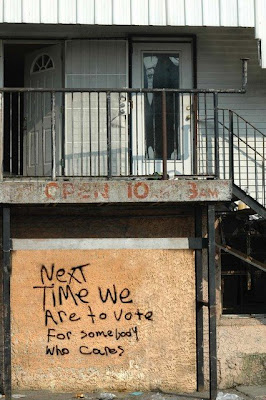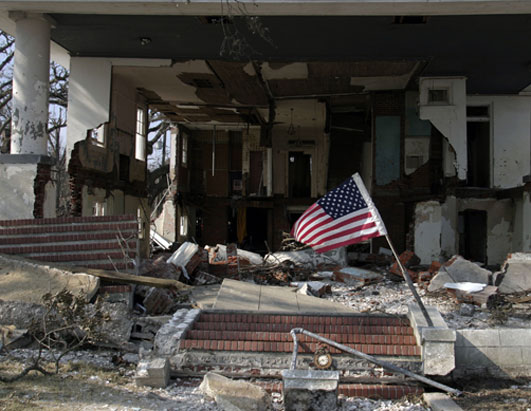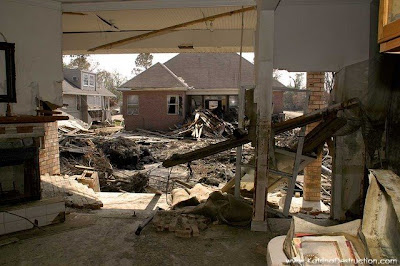
On August 28, 2005 Hurricane Katrina formed in the Gulf of Mexico. It was a category 5 storm, the highest ranking given for hurricanes. When it hit land on August 29, it had dropped to a low category 4 or high category 3 storm. Countless stories from citizens of the Gulf Coast recount that people in that area of the United States are used to hurricanes, but no one was prepared for a storm of this magnitude. The property damage from wind alone would have been devastating, but what distinguished this major event was the water.

 The Federal government was strongly criticized after Katrina for its remarkably poor preparation for and response to the storm. An estimated 27% of New Orleans residents had no means of private transportation, so though a mandatory evacuation was called on August 28, no provisions were made to aid the people unable to evacuate themselves. Therefore, when it hit, many people were left only to brace themselves for what was about to happen. Many of the 1,836 Katrina-related deaths happened after the storm itself, due to lack of shelter, water, food, and proper medical attention when necessary. Citizens complained of being stranded for days with the sense that no one was coming for help. Though President Bush signed a $10.5 billion relief package, the processes were very slow in turning money into direct aid.
The Federal government was strongly criticized after Katrina for its remarkably poor preparation for and response to the storm. An estimated 27% of New Orleans residents had no means of private transportation, so though a mandatory evacuation was called on August 28, no provisions were made to aid the people unable to evacuate themselves. Therefore, when it hit, many people were left only to brace themselves for what was about to happen. Many of the 1,836 Katrina-related deaths happened after the storm itself, due to lack of shelter, water, food, and proper medical attention when necessary. Citizens complained of being stranded for days with the sense that no one was coming for help. Though President Bush signed a $10.5 billion relief package, the processes were very slow in turning money into direct aid.
The facts and numbers mentioned above will soon fade into the past. But it is the intangible impact of the storm, what cannot be quantified, that will have the longest effect. Lessons learned from Katrina made the government response to Hurricane Gustav well planned and carried out, but the storm also taught this country other lessons about unity and caring for one another. The pictures and video from the storm serve to remind us of the dangers of natural disasters, but even they will lose their ability to evoke feelings and emotion. What last are experiences residents of the Gulf Coast and residents of the rest of the world have had in shared efforts to remember, but to move on, rebuild, relieve, and restart homes and lives.

Not only was the sense of American unity after the storm remarkable, but over 76 countries worldwide offered aid in many forms, including sending money, teams of people, and materials starting immediately after the hurricane hit. Today, over three years after the storm, the real stories should not be about the tragedies, they will always be recognized of course, but about how Katrina brought this country and the world together. These are stories of hope, and the power that even one person with an idea can have.  That one person can be anyone, from anywhere. One example is Norm Andrzejewski, a retired contractor from Liverpool, NY. At the risk of sounding cliched, this man is an inspiration. He has single-handedly created and run Operation Southern Comfort, since right after the hurricane. It all began when he decided to head down to St. Bernard Parish, independent from any national or international organizations, and see what needed to be done. Since then, he has recruited people of all ages and professions to join him in his periodic week-long trips. He has fostered an environment of caring that will stay in the hearts of everyone who knows him forever.
That one person can be anyone, from anywhere. One example is Norm Andrzejewski, a retired contractor from Liverpool, NY. At the risk of sounding cliched, this man is an inspiration. He has single-handedly created and run Operation Southern Comfort, since right after the hurricane. It all began when he decided to head down to St. Bernard Parish, independent from any national or international organizations, and see what needed to be done. Since then, he has recruited people of all ages and professions to join him in his periodic week-long trips. He has fostered an environment of caring that will stay in the hearts of everyone who knows him forever.
The desire to help is not what distinguishes Norm as a remarkable person, it is his unfailingly committed attitude to make a tangible difference in this world. Many people have energy and want to help out, they want to have a cause, some sort of purpose or direction for their energies. However, this energy is often short lived, and though ideas are good, consistent action is crucial. So far, Operation Southern Comfort has completed seventeen rebuilding trips to the gulf coast, and Norm has been there through it all. There has only been one trip Norm was not present for all of, and it was due to a death in the family. However, even under those circumstances, he flew down a few days later. In the preparation and early stages of the trip he missed, his absence was extremely apparent, and people began to realize he was the glue holding everything together for years.

People do not always know what to expect to see as soon as they cross the bridge into New Orleans, especially this long after the storm. For years, the urgent Katrina news stories have been sharply declining, replaced by other events around the world. As "out of sight out of mind" goes, the hurricane falls completely out of people's consciousness. The terribly unfortunate thing about this loss of interest is that the struggle to survive is by no means over.
Members of Operation Southern Comfort joke that we have so much fun on our trips that we hope the work never stops, but this is not to mean that we would not love to see some larger improvements. Faster progress cannot be achieved though, without governmental aid or efforts from larger organizations. The kind of progress Operation Southern Comfort can foster is humbler, but no less noble and important.

The same roads that were formerly unnavigable by car are dry now, and members of Operation Southern Comfort travel these roads, eager to get to job sites. Even as we drive though, the knowledge that three years ago we would have been under water stays with us. The progress is becoming visible, and with each family that takes the step to move back to their homes, hope and excitement is renewed. This is the same hope and excitement instilled in the hearts of Norm Andrzejewski and many other visionaries just like him, that has been spread to touch countless lives. Norm never would have imagined Operation Southern Comfort could have come this far and grown so much in numbers, but he never stopped pushing for greater things and will continue to do so for as long as he is able. Then, after he is unable, the people who hold his ideas and hope so close will keep his legacy and continue to have a positive influence on this country and the world.
